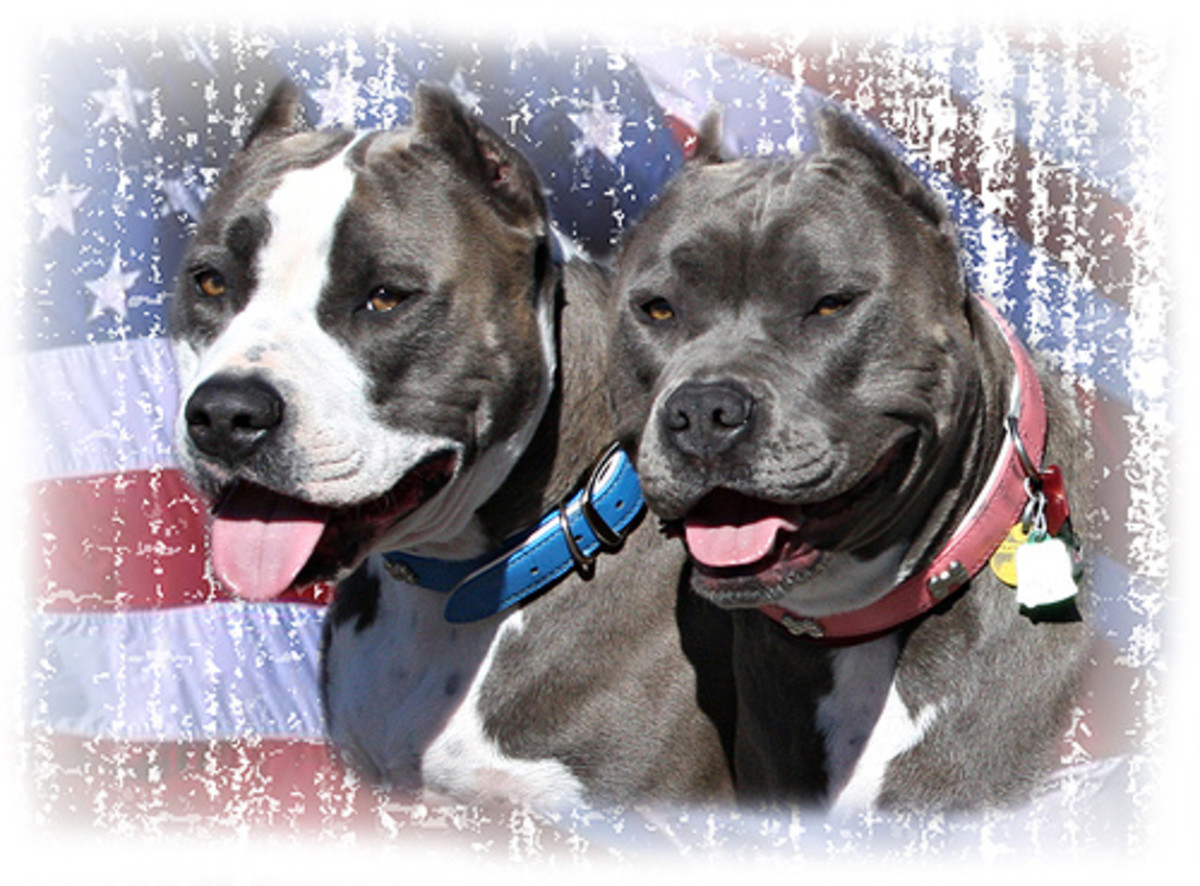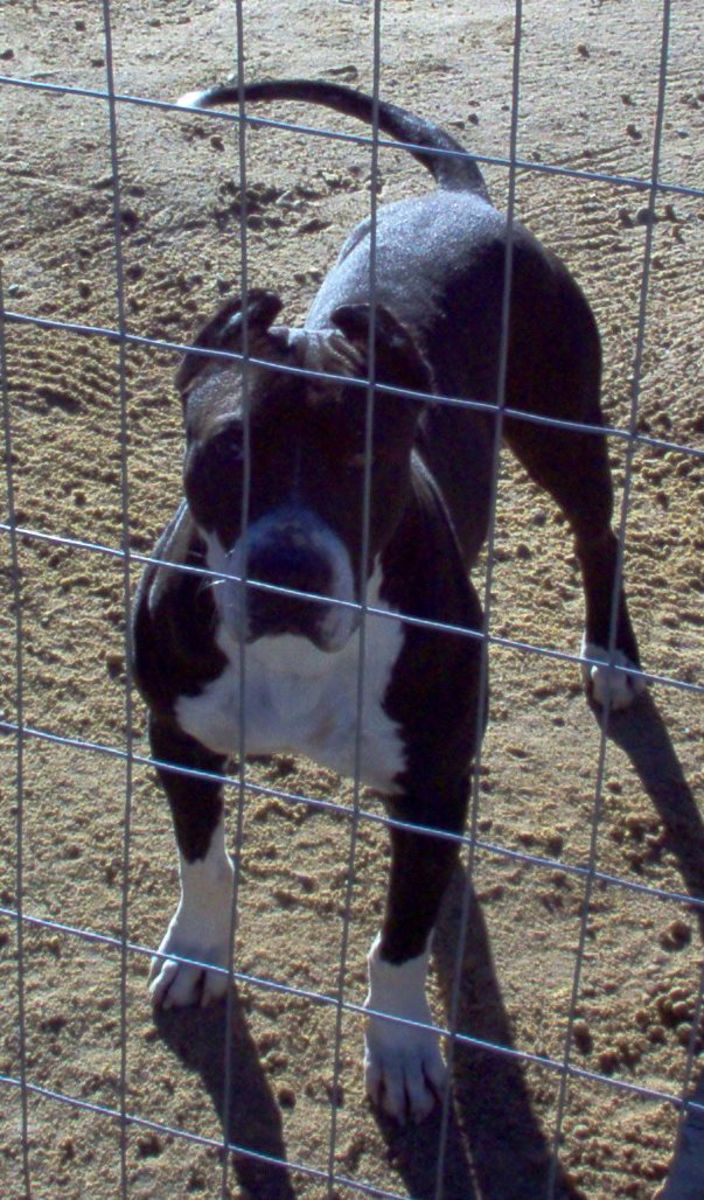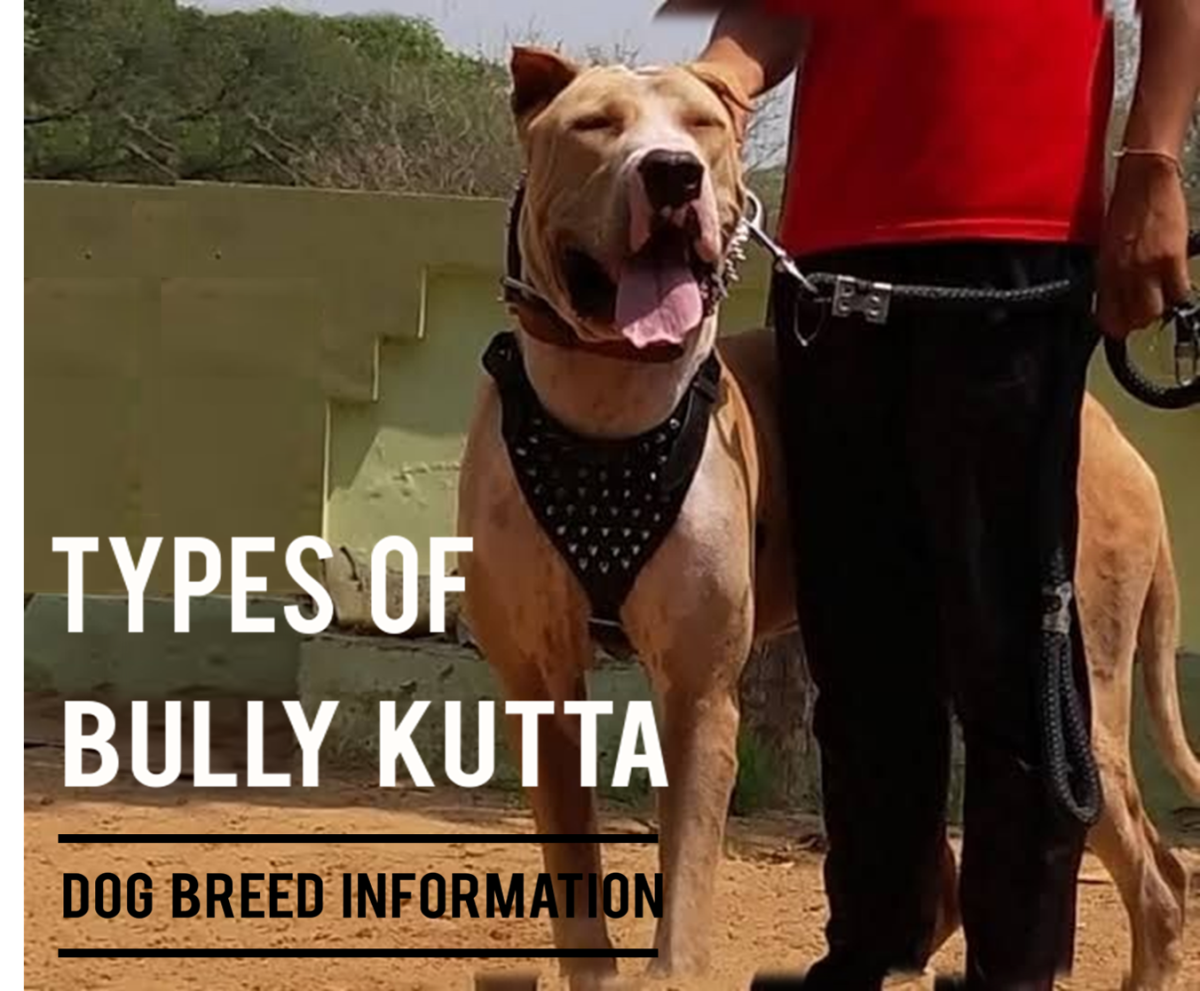Should Pit Bulls Be Banned In your State?
White Pit bull With Collar
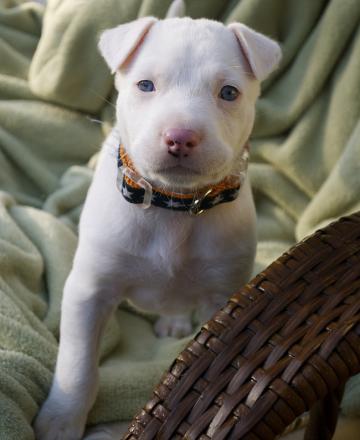
PIT BULL with CHILDREN
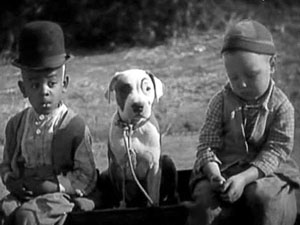
Charcoal Pit Bull
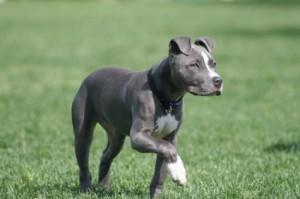
Are You Safe With A Pit Bull In Your Neighborhood?
In the 8-year period from 2005 to 2012, Pit Bulls killed 151 humans. This represents 60% of all humans killed by dog bites. Pit Bulls and Rottweilers combined accounted for 73% of all deaths.
The American Pit Bull Terrier is infamous for being aggressive and for killing humans. Many states and communities have enacted legislation banning the dogs. Many State and Federal Courts have upheld the bans in many states and communities. Ohio, Kansas, WA, Iowa, Utah, Arkansas, Colorado, W VA. WI, CA, etc all have cities and communities where the banning of the dogs has been upheld by state and federal courts.
The legal name of the movement to ban the dogs is Breed Specific Legislation. In 2001, the Supreme Court in Alabama ruled that that there was no evidence that one breed of dog was more dangerous than another, simply because of it's breed.
The action in Alabama was brought by The Washington Animal Foundation against the city of Huntsville which claimed that American Pit Bull Terriers were genetically dangerous.
The case was initiated by (2) women who had adopted (4) Pit Bulls being held at the local animal shelter. The dogs were part of a group of (50) seized in a raid on a dog fighting ring in 2000. Twenty Five of the dogs died from injuries or disease while those remaining, including the (4) puppies were held in the city animal shelter and put up for adoption.
One woman, an emergency room nurse adopted two of the puppies, naming them Elizabeth and Justice. The other two were adopted by a military officer's wife who named them David and Nellie.
The city refused to release the dogs stating that they were a danger to human beings though the puppies had never displayed any aggression. The case was referred to court for a decision. The women, representing themselves argued that the puppies had never been trained for fighting and therefore were not dangerous.
The court agreed with the women stating that the four puppies were not dangerous because they had not been trained to fight.
The city of Huntsville appealed the ruling to the Alabama Supreme Court to prevent the women from assuming custody.
This time around, the Seattle based Washington Animal Foundation (WAF) became involved and appointed a lawyer to fight their case based on evidence they gathered to refute the city's lawyer's claim that Pit Bulls were genetically dangerous.
Though they hired a Vet to examine the dogs, the officers at the animal shelter refused to allow him to examine them. He did report that they looked fat, happy and starved for attention.
WAF presented the following evidence to the court:
- expert treatises on the genetics of the Pit Bulls
- testing and studies on genetics versus environment as the catalyst for dog aggression
- social contributions made by the American Pits as service dogs, assistance dogs, rescue dogs, etc.
The court ruled in favor of WAF and the canines were released to their adoptive families.
Glen Bui of WAF had this to say about the genetic make up of the American Pit Bull Terrier.
"For years the American Pit Bull Terrier has been alleged to be dangerous because of its genetics. Never has WAF found any genetic research proving that. When we were asked by three Huntsville women for help, they told us nobody else would help them, they had contacted everyone who fights BSL. We knew the women had to face the Supreme Court and this was a very serious case. We knew we had the genetic proof that no breed of dog is dangerous."
"We knew we also had statistics which proved the American Pit Bull Terrier has one of the best temperaments out of 185 dog breeds along with a strong legal defense." Glen Bui of WAFIn April of 2012, Maryland ruled that Pit Bulls are inherently dangerous, but many experts and animal rights advocates do not agree with the ruling.
Jennifer Scarlet, a veterinarian and co-president of the San Francisco SPCA also disagreed with the Maryland ruling and has debated the issue in court and other public forums. She believes that many of the dogs nation wide are highly socialized and well trained, never hurting anyone.
It is estimated that 20 -30% of a dog's behavior is based on genetics. This means that at least 70% can be attributed to environment or nurturing
The American Pit Bull Terrier was brought to America in the 1800s just before the Civil War by British citizens who immigrated to America bringing with them their much loved animals. In the British Isles the dogs were bred for fighting.
In America, the Pit Bulls were touted for their love of children. Many families owned the dogs and used them to guard their children as well as their homes. They protected their homes against wild animals. They killed vermin that attacked their food stores and fought off coyotes. They also caught wild hogs and held them down until their masters arrived.
The dogs were thought of as family members and much loved companions. They became a symbol of the American people as they symbolized strength, courage and loyalty. They were used in commercials, endorsed products i.e., RCA Victor used the dog and a gramophone on it's ads, Buster Brown shoes also used one of the dogs.They were used in WWI advertising propaganda. Many platoons and soldiers kept Pit Bulls. A Pit Bull starred in the TV show "Our Gang".
Athletes were called Pit Bulls in the 1930s. The dogs also starred in movies or early day "motion pictures."
Once America became more urbanized, crime spread and criminals began to buy and breed the dogs for entertainment and monetary or gambling purposes. They introduced dog fighting to the American people. The dogs were now seen as money making commodities rather than as loving and loyal companions.
It was these criminal types who were often mean spirited, aggressive and prone to violence themselves that nurtured the American Pit Bull. They abused and neglected the dogs, thereby turning them into mean and vicious animals like themselves.
Criminals have bred Pit Bulls for generations for fighting each other. They are usually ready to fight at around (6) months old when they reach sexual maturity, or (18) months when they reach social maturity.
Records show that from the early 1900s to the early 80s there was only ONE Pit Bull attack on a human being. This attack involved a man who sicced a pack of (26) dogs on a young woman in St. Petersburg, Fla in 1947 and was convicted of manslaughter.
In 1976 the Supreme Court passed the Animal welfare Act making dog fighting illegal in all 50 states.
Dog fighting returned to the USA during the 80's and pits were often used by drug dealers to guard marijuana crops. A two and one-half year old boy was killed in California in 1987 by a Pit Bull guarding a marijuana crop. That same year, many communities and states enacted Pit Bull ban legislation to ban the canines.
Animal professionals did not support the bans.
The dogs began to be villified by the American people based on misinformation. Some of the myths perpetuated were, their owners made them meaner by feeding them gunpowder and tobasco sauce in their food, the dogs have locked jaws, they are inherently vicious, and they turn on their owners.
It is factual that these dogs owners do not feed them gun powder or hot sauce to make them mean. A study conducted by Dr.Lehr of the University of Ga found that, "Pit Bulls do not have any special mechanism that would allow these dogs to lock their jaws."
It is factual that Pit Bulls do not turn on their owners, that there are millions of them in homes living successfully and have stable temperaments. Dogs that bite people are unstable troubled dogs that have been raised by irresponsible and reckless individuals who ignore signs of aggression in their dogs.
Information presented in this article is balanced. It has been shown that Pit Bulls should not be singled out by the passage of Breed Specific Legislation which bans them from certain states or communities...that they are not inherently killers of humans.... that they take on the characteristics of their owners and environments, and that at one time in America these dogs were honored by and represented the American people and this nation. They were war heroes. They were guardians of our children. They kept our homes safe from vermin and wild animals. They were our loyal and trustworthy companions. They befriended and helped our soldiers and the military.
Pit Bulls are less likely to bite than many other breeds. In temperament Evaluations provided by the American Temperament Test Society, the dogs earned a very high passing score, 82.6%. The passing score for the other dog breeds tested scored an average of 77%.
No spayed or neutered, indoor Pit Bull has ever killed a person.
On the other hand those not spayed or neutered killed 151 humans in America from 2005-2012 and they account for 60% of deaths by dog bites. Evidence has shown that the owners of these dogs as well as their environments are predeterminants of whether they will be aggressive and violent.
Studies conducted by the Center for Disease Control showed that an individual is more likely to be killed by:
..............than being killed by a Pit Bull.
- a family member
- a falling coconut
- in a bedroom slipper accident
- choking on a marble
- drowning in a 5 gallon bucket of water
- getting struck by lightning
I personally have two Pit Bulls as my babies, my good and faithful friends and as my play and walk/hike buddies. I have found them to be sweet, loving, gentle, wonderful companions and trustworthy. They both love people and are socialized with other dogs. I will admit that they try to chase cats, but the one time my oldest one actually caught a cat was when he was a young puppy. He simply tossed it about gently and tried to play with it. I, on the other hand, was terrified and thought for sure he would bite and kill it.
The only thing I'd like to add is that even (1) death by a Pit Bull is too many, especially if it's you, your friends or your family member. I recommend legislation for the owners as that's where the problem lies. I know that I would not trust a Pit Bull raised by some individuals in some environments. How that would be done is a slippery slope as some subjectivity might be involved. I will leave the decision as to whether Pit Bulls should be banned in your neighborhood up to you and your individual preferences.
http://www.dontbullymybreed.org/
http://www.cesarsway.com/dogbehavior/basics/How-Did-Pit-Bulls-Get-a-Bad-Rap#ixzz2P6Ctpb5t
http://www.bulladelphia.org/understandabull_mythvsfact.aspxhttp:
http://www.dogbreedinfo.com/americanpitbull.htm
http://www.dogsbite.org/dog-bite-statistics-fatalities-2012.php
http://companionanimalsolutions.com/blogs/
SES by <a href="http://www.degreeadvantage.com/business-degrees.html">business degree online</a> promotion team.

